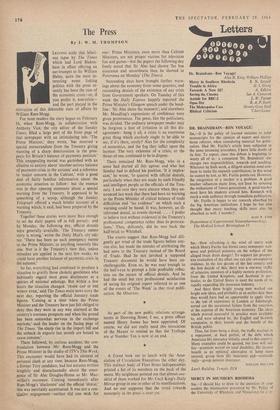By J. W. M. THOMPSON
For most readers the story began on February 16, when Rees-Mogg, in collaboration with Anthony Vice, the city editor of the Sunday Times, filled a large part of the front page of that newspaper with an intimidating tale. `The Prime Minister,' they wrote, 'has received a special memorandum from the Treasury giving warning of a sharp deterioration in the pros- pects for Britain's balance of payments position.' This unappealing morsel was garnished with an allusion to anxiety about 'another serious balance of payments crisis in the autumn' and a reference to 'major concern in the Cabinet,' with a good deal of fairly familiar information about the economic situation to follow: but the essence was in that opening statement about a special warning from the Treasury. It appeared to be something of a scoop, although the Sunday Telegraph offered a much briefer account of a warning which, it said, had been prepared by the Treasury.
Together these stories were more than enough to set the daily papers off in full pursuit: and by Monday, the following day, official denials were generally available. 'The Treasury memo story is wrong,' wrote the Daily Mail's city edi- tor. 'There has been no such emergency memo to the Prime Minister, or anything remotely like one. Nor is it the Treasury's view that, unless remedies are applied in the next few weeks, we could have another balance of payments crisis in the autumn.'
So far, everything 'had combined to produce a situation to gratify those choleric gentlemen who habitually regard most press disclosures as a species of national sabotage. But within a few hours the situation changed. 'TRADE GAP IS THE WORST EVER,' said The Times main news story the next day, reporting the official January trade figures. `Coming at a time when the Prime Minister and the Treasury have just felt obliged to deny that they were in any way alarmed at the country's overseas prospects and when the pound has been somewhat nervous in the exchange markets,' said the leader on the facing page of The Times, 'the sharp rise in the import bill and the setback in exports last month are bound to cause concern.'
There followed, by curious accident, the con- frontation between Mr. Rees-Mogg and the Prime Minister in the studio of ITV's This Week. This encounter would have had its element of personal clash at any time, because Rees-Mogg, a former Tory candidate, had last autumn written lengthily and disenchantedly about the emer- gence of Sir Alec Douglas-Home as Mr. Mac- millan's successor. Coming immediately after Rees-Mogg's `disclosure' and the official `denial,' this was inevitably accentuated. It was not a con-
Cjltgive did one wish for
one: Prime Ministers, even more than Cabinet Ministers, are not proper victims for television fun and games—but the papers the following day freely noted that Sir Alec had shown `far less assurance and smoothness than he showed in Panorama on Monday' (The Times).
Succeeding days have brought further warn- ings about the economy from some quarters, and resounding denials of the existence of any crisis from Government speakers. On Tuesday of this week the Daily Express happily reported the Prime Minister's Glasgow speech under the head- line: 'Sir Alec slams the moaners'; and elsewhere Mr. Maudling's expressions of confidence were given prominence. The press, like the politicians, was divided. The ordinary newspaper reader may be forgiven a hint of irritation at all this dis- agreement: hang it all, a crisis is an enormous great thing which anybody ought to be able to see, if it's there, surely? Alas for the complexity of economics, and the fog they inflict upon the layman. The very existence of a crisis, or the threat of one, continued to be in dispute.
There remained Mr. Rees-Mogg, who in a sense had started all this uproar and who last Sunday had to defend his position. 'It is unplea- sant,' he wrote, 'to quarrel with official denials, particularly when they are made by such friendly and intelligent people as the officials of the Trea- sury. I am sure they were sincere when they an- nounced last week that there had been no warning to the Prime Minister of critical balance of trade difficulties and "no evidence" on which such a warning could be based. It was, however, an ill- informed denial, as events showed. . . . I prefer to believe (not without evidence) in the Treasury's professional competence rather than its protesta- tions.' Thus, delicately, did he toss back the half-brick to Whitehall.
• The events suggest that Rees-Mogg had dili- gently got wind of the trade figures before any- one else, but made the mistake of attributing the bad news to the Treasury instead of the Board of Trade. Had he not invoked a supposed Treasury document he would have been un- challengeable. Even so, he was near 'enough to the bull's-eye to prompt a little profitable reflec- tion on the nature of official denials, And he had the small but rare professional satisfaction of seeing his original report referred to as one of the events of `The Week' in that rival publi- cation, the Observer.
As part of the new public relations arrange- ments at Downing Street, I see, a press officer named Henry James has been appointed. Of course, we did not really need this invocation of the Master to remind us that the Trollope era at Number Ten is now at an end.
A friend took me to lunch with the Asso- ciation of Circulation Executives the other day. This stalwart body of Fleet Street indispensables printed a list of its members on the back of the menu. My neighbour pointed out that almost one- third of them worked for Mr. Cecil King's Daily Mirror group in one or other of its Manifestations. And no one supposes that the trend towards monopoly iri the press is over yet.


































 Previous page
Previous page